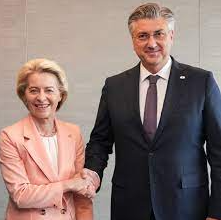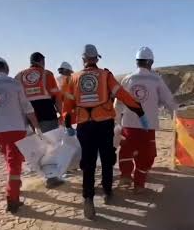
Celebrations Mark Transition to Euro and Inclusion in Schengen Area
The President of the European Commission, Ursula von der Leyen, visited Croatia on Sunday to acknowledge the “immense achievements” of the nation, which is the latest member to join the EU. Croatia celebrated the New Year by adopting the euro and entering the world’s largest passport-free travel zone.
Von der Leyen met with Croatian and Slovenian leaders at the Bregana border crossing, which became redundant within moments of 2023 as Croatia joined the Schengen Area. At midnight, Croatia phased out its national currency, the kuna, in favour of the euro, now used by 347 million Europeans.
“There is no place in Europe where it is more evident that we are experiencing a season of new beginnings than here at the border between Croatia and Slovenia,” von der Leyen remarked. “This is indeed a day for the history books.”
Since joining the EU in July 2013, Croatia has taken on the responsibility of safeguarding the Schengen Area’s external borders, a duty previously held by Slovenia since its accession in May 2004. Following discussions with von der Leyen and Slovenian President Natasa Pirc Musar, Croatian Prime Minister Andrej Plenkovic committed to managing the eastern borders with non-EU countries Bosnia, Serbia, and Montenegro.
Plenkovic assured that Croatia would not erect physical barriers with its eastern neighbours but instead leverage its EU integration experience to assist them in achieving similar goals. Pirc Musar echoed this sentiment, emphasising that the correct path for Western Balkan countries is to align their policies with the EU, expressing hope that Slovenia and Croatia would collaborate to support their neighbours in joining the bloc.
Bosnia, Serbia, and Montenegro are all pursuing EU membership at varying stages. Montenegro and Serbia have been in formal accession talks for several years, while Bosnia was granted candidate status in December.
The EU’s expansion efforts have faced challenges in recent years, but following Russia’s invasion of Ukraine in February 2022, EU officials have underscored the importance of strengthening engagement with Western Balkan nations to enhance Europe’s security.










